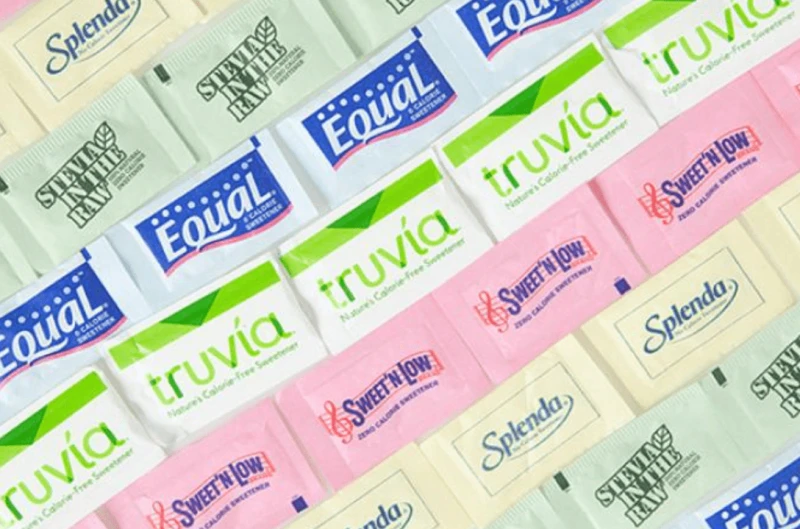Sucralose, aspartame, stevia: With the use of sugar substitutes continuing to rise, questions mount about their impact on diets
Sucralose, aspartame, stevia: With the use of sugar substitutes continuing to rise, questions mount about their impact on diets
Aaron Steckelberg, Anahad O'Connor, Laura Reiley | Washington Post | January 9, 2024
XLinkedInFacebookRedditBlueskyThreads


Many people are cutting back on their sugar intake for health reasons. But the food industry has found another way to give consumers their sweet fix.
It is quietly replacing the sugar in many packaged foods with sucralose, stevia, allulose, erythritol and a wide variety of other artificial sweeteners and sugar substitutes.
Follow the latest news and policy debates on sustainable agriculture, biomedicine, and other ‘disruptive’ innovations. Subscribe to our newsletter.
The number of food products containing low- or no-calorie sugar substitutes has surged in the past five years, according to an analysis by Mintel, the market research firm.
…
Scientists used to think that non-nutritive sweeteners were largely inert, activating sweet receptors on our tongues and passing through our bodies without causing metabolic changes.
…
But one rigorous study led by Suez at the Weizmann Institute of Science with researcher Eran Elinav looked at what happened when people were given aspartame, saccharin, stevia, or sucralose in amounts well below the FDA’s daily allowances. The study found that these sweeteners caused changes in both the function and composition of the participants’ gut microbiomes, the communities of bacteria, viruses and fungi that live in the intestines.
This is an excerpt. Read the original post here
XLinkedInFacebookRedditBlueskyThreads

 | Videos | More... |

Video: Nuclear energy will destroy us? Global warming is an existential threat? Chemicals are massacring bees? Donate to the Green Industrial Complex!
 | Bees & Pollinators | More... |

GLP podcast: Science journalism is a mess. Here’s how to fix it

Mosquito massacre: Can we safely tackle malaria with a CRISPR gene drive?

Are we facing an ‘Insect Apocalypse’ caused by ‘intensive, industrial’ farming and agricultural chemicals? The media say yes; Science says ‘no’
 | Infographics | More... |

Infographic: Global regulatory and health research agencies on whether glyphosate causes cancer
Does glyphosate—the world's most heavily-used herbicide—pose serious harm to humans? Is it carcinogenic? Those issues are of both legal and ...
 | GMO FAQs | More... |

Why is there controversy over GMO foods but not GMO drugs?
Genetic Literacy Project

How are GMOs labeled around the world?
Genetic Literacy Project

How does genetic engineering differ from conventional breeding?
Genetic Literacy Project
 | GLP Profiles | More... |

Alex Jones: Right-wing conspiracy theorist stokes fear of GMOs, pesticides to sell ‘health supplements’




 Viewpoint — Fact checking MAHA mythmakers: How wellness influencers and RFK, Jr. undermine American science and health
Viewpoint — Fact checking MAHA mythmakers: How wellness influencers and RFK, Jr. undermine American science and health Viewpoint: Video — Big Solar is gobbling up productive agricultural land and hurting farmers yet providing little energy or sustainabilty gains
Viewpoint: Video — Big Solar is gobbling up productive agricultural land and hurting farmers yet providing little energy or sustainabilty gains Fighting deforestation with CO2: Biotechnology breakthrough creates sustainable palm oil alternative for cosmetics
Fighting deforestation with CO2: Biotechnology breakthrough creates sustainable palm oil alternative for cosmetics Trust issues: What happens when therapists use ChatGPT?
Trust issues: What happens when therapists use ChatGPT? 30-year-old tomato line shows genetic resistance to devastating virus
30-year-old tomato line shows genetic resistance to devastating virus California, Washington, Oregon forge immunization alliance to safeguard vaccine access against federal undermining
California, Washington, Oregon forge immunization alliance to safeguard vaccine access against federal undermining The free-range chicken dilemma: Better for birds, but with substantial costs
The free-range chicken dilemma: Better for birds, but with substantial costs ‘You have to treat the brain first’: Rethinking chronic pain with Sanjay Gupta
‘You have to treat the brain first’: Rethinking chronic pain with Sanjay Gupta
